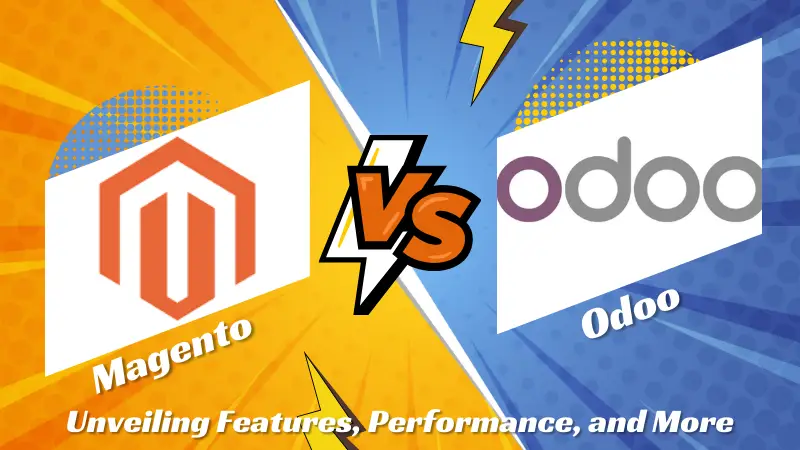
The Ultimate eCommerce Showdown: Magento vs. Odoo – Unveiling Features, Performance, and More
Are you ready for an eCommerce showdown? Today, we’re putting two heavyweight contenders head-to-head: Magento and Odoo. These platforms are powerhouses in the world of eCommerce, each offering unique features and capabilities. Whether you’re a seasoned online retailer or just dipping your toes into the eCommerce waters, choosing the right platform is crucial for your business’s success. So, let’s dive in and explore the ins and outs of Magento and Odoo, from features to performance and everything in between.
1. Introduction to Magento and Odoo
Before we jump into the nitty-gritty details, let’s get acquainted with our contenders.
Magento: A veteran in the eCommerce realm, Magento is an open-source platform renowned for its flexibility and scalability. It empowers businesses of all sizes to create robust online stores with extensive customization options.
Odoo: On the other hand, Odoo is an all-in-one business management software that encompasses various modules, including eCommerce. It offers seamless integration with other business functionalities like CRM, inventory management, and accounting.
2. Features Face-off: Magento vs. Odoo
Product Management:
- Magento: With Magento, you get unparalleled control over your product catalog. Its intuitive interface allows you to easily add, edit, and organize products, attributes, and categories.
- Odoo: Odoo’s product management module seamlessly integrates with other aspects of your business, ensuring streamlined operations. It offers features like product variants, multiple pricing options, and automatic stock updates.
Customization Capabilities:
- Magento: As an open-source platform, Magento offers extensive customization options. From themes and extensions to APIs and integrations, you can tailor your online store to suit your unique requirements.
- Odoo: While Odoo may not be as customizable as Magento out of the box, its modular approach allows for flexibility. You can customize and extend Odoo’s functionality through its vast selection of apps and modules.
Scalability:
- Magento: Scalability is where Magento truly shines. Whether you’re a small startup or a large enterprise, Magento can scale with your business. Its robust architecture and extensive feature set ensure that your online store can handle high traffic and growing demands.
- Odoo: While Odoo is known for its scalability in terms of business management, its eCommerce module may have limitations for larger enterprises. However, for small to mid-sized businesses, Odoo’s scalability should suffice.
Performance:
- Magento: With its optimized codebase and performance-focused architecture, Magento delivers exceptional speed and performance. However, it’s essential to invest in proper hosting and optimization techniques to maximize performance.
- Odoo: Odoo’s performance can vary depending on factors like server configuration and the number of modules installed. While it may not match Magento’s performance out of the box, with proper optimization, it can deliver satisfactory results.
3. User Experience and Interface
- Magento: Magento offers a user-friendly interface, but it may have a steeper learning curve for beginners. However, once you familiarize yourself with its features, navigating Magento becomes more intuitive.
- Odoo: Odoo boasts a clean and modern interface that’s easy to navigate. Its user-friendly design makes it suitable for businesses of all skill levels, from novice users to experienced professionals.
4. Community and Support
- Magento: As an established platform, Magento has a vast community of developers, users, and resources. You’ll find a plethora of forums, documentation, and tutorials to assist you in your Magento journey.
- Additionally, there are numerous Magento development companies and developers specializing in Magento customization, extensions, and support services.
- Odoo: Odoo also has a supportive community and a wealth of resources available. From forums and documentation to professional support services, you’ll find ample assistance for your Odoo implementation.
5. Pricing
- Magento: Magento Open Source (formerly known as Magento Community Edition) is free to download and use. However, you’ll need to invest in hosting, extensions, and development services.
- Magento Commerce (formerly known as Magento Enterprise Edition) is a premium offering with advanced features and support, suitable for large enterprises.
- Odoo: Odoo offers a free community edition with limited features, ideal for small businesses. For access to advanced features and support, you can opt for Odoo’s enterprise editions, which are subscription-based.
6. Conclusion: Choosing the Right Platform
In the battle of Magento vs. Odoo, there’s no clear winner. Both platforms have their strengths and weaknesses, and the right choice depends on your specific business needs, budget, and technical expertise.
If you’re looking for a highly customizable platform with robust eCommerce capabilities, Magento is an excellent choice. With its extensive feature set and scalability, Magento can accommodate businesses of all sizes.
On the other hand, if you prefer an integrated business management solution with eCommerce functionality, Odoo may be the right fit. Its modular approach and seamless integration with other business modules make it a compelling option for small to mid-sized businesses.
Ultimately, whether you opt for a Magento development company or an Odoo implementation partner, investing in professional expertise is crucial for maximizing the potential of your chosen platform.
In conclusion, whether you’re Team Magento or Team Odoo, the key is to evaluate your business requirements carefully and choose the platform that aligns best with your goals and objectives. Happy eCommerce-ing!
Frequently Asked Questions (FAQs)
What is a Magento development company?
A Magento development company specializes in creating, customizing, and maintaining Magento-based eCommerce websites. These companies typically offer a range of services, including design, development, optimization, and support.
How do I find a reliable Magento developer?
To find a reliable Magento developer, you can start by exploring Magento’s official directory of solution partners. Additionally, you can seek recommendations from other businesses, browse freelancer platforms, or attend Magento events and conferences to connect with experienced developers.
Can I migrate from Odoo to Magento, or vice versa?
Yes, it’s possible to migrate from Odoo to Magento or vice versa, but it can be a complex process depending on the size and complexity of your eCommerce store. It’s recommended to seek assistance from experienced developers or migration specialists to ensure a smooth transition.
What factors should I consider when choosing between Magento and Odoo?
When choosing between Magento and Odoo, consider factors such as your business size, scalability requirements, customization needs, budget, and integration with other business systems. Evaluate the features, performance, user experience, community support, and pricing of each platform to make an informed decision.
Do I need technical expertise to manage Magento or Odoo?
While technical expertise can be beneficial for managing Magento or Odoo, both platforms offer user-friendly interfaces and intuitive tools that make it accessible to users with varying levels of technical knowledge. Additionally, you can rely on external resources such as tutorials, documentation, and support services to assist you in managing your eCommerce platform effectively.
Tags: hire Odoo developers, Magento developer, Magento Development company, Magento vs. Odoo, Odoo development, Odoo development company





